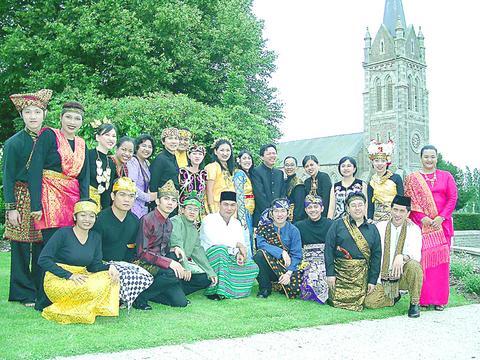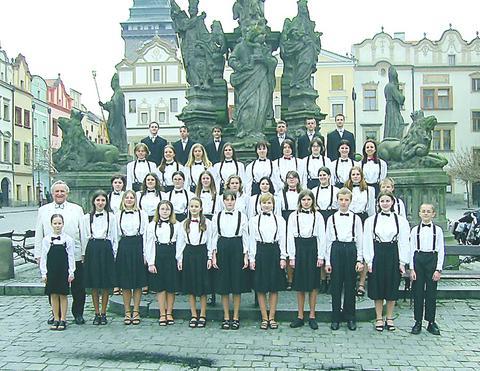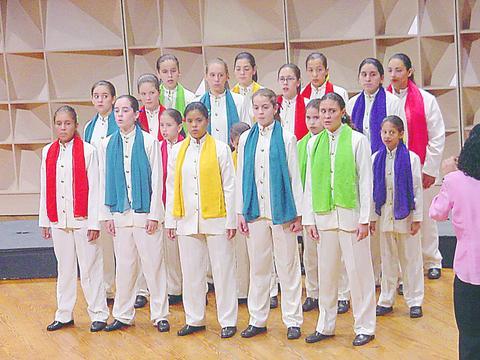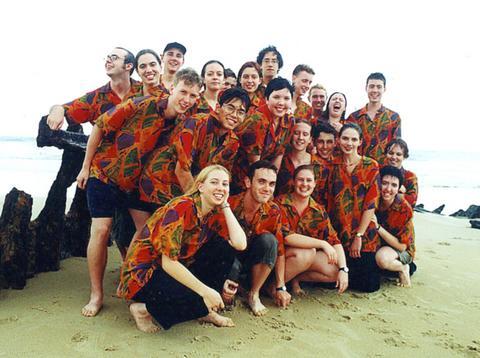The biennial Taipei International Choral Festival (
Six prestigious international choirs will be attending and these include: Nordic Voices from Norway, Australian Voices from Australia, Incheon City Chorale from South Korea, the Batavia Madrigal Singers from Indonesia, Iuventus Cantans from Czech Republic, and Aequalis Aurea from Venezuela. Also performing are 20 local choirs.
"This year we have a strong line-up of choirs that will have been rarely seen in similar choral events in Taiwan," said Dirk Du Hei (

PHOTO COURTESY OF TAIPEI PHILHARMONIC FOUNDATION OF CULTURE AND
"We promise to offer an exhilarating celebration of choral art," Du said.
The Final Gala Concert will feature Leonard Bernstein's Chichester Psalms and will be performed by the six international groups as well as the Taipei Philharmonic Chorus (
Prior to the concerts, there is a special film screening of the French movie Les Choristes to mark the opening of the festival. The screening will take place next Friday at Spring Cinema. The film can be seen as a French version of Dead Poets Society but the teacher influences the students with choral skills instead of reading old poems.

PHOTO COURTESY OF TAIPEI PHILHARMONIC FOUNDATION OF CULTURE AND
Apart from the concerts, there are also choral music camp and conducting workshop. Alberto Grau, Denes Szabo and Serene Liang (
There are also free "Afternoon Concerts," to be held at Songjiang Garden, National Taiwan University Hospital and Shinkong Mitsukoshi Department Store in the Xinyi district, where you can have a cup of tea and chat a little while enjoying the singing.
The Batavia Madrigal Singers from Indonesia won three awards in the international choir competition Florilege Vocal de Tours, France. It was the champion in the "Free Program" category, won third prize in "Vocal Ensemble" and received a special award from the French minister of culture for the "Best Interpretation of a French Composition."

PHOTO COURTESY OF TAIPEI PHILHARMONIC FOUNDATION OF CULTURE AND
Australian Voices is led by leading composer and conductor Stephen Leek. In 1996, the group was selected to represent Australia in the "Concert For Peace" in war-torn Bosnia-Herzegovina, sharing the stage with Jose Carreras before an audience of the world's royalty. The troupe's major accolades include the 1998 Bela Bartok International Choral Competition in Hungary. It was also a multiple major prize-winner at the 2001 International Choral Eisteddfod in Llangollen, Wales.
The Pardubice Children Choir Iuventus Cantans from the Czech Republic was founded in 1960 by Vlastislav Novak who has been conductor and artistic director since its foundation. In 2000, the group won two silver medals at the first World Choir Olympic organized in Linz, Austria, with the participation of 360 choirs from all over the world. Although it's a choir with classic training and a long history, its repertoire ranges from Czech folk songs, to the Beatles and Michael Jackson.
Aequalis Aurea from Venezuela was formed by combining two choirs: Aequalis and Voces Prisma, both founded by Venezualan conductor Ana Maria Raga.

PHOTO COURTESY OF TAIPEI PHILHARMONIC FOUNDATION OF CULTURE AND
Nordic Voices from Norway is a six-voice a cappella ensemble. Each member was educated at the State Academy of Music in Oslo and the National Academy of Operatic Art in Oslo, where they specialized in opera, composition, church music and conducting. In addition to its classical and romantic repertoire, the group is known for championing 20th century modern music.
The Incheon City Chorale from South Korea is led by professor Yoon Hak-woon, the pioneer of Korean choir history. In 1997, the group was invited to the Namur World Choral Festival to celebrate the 15th anniversary of the international Federation of Choral Music and to Europa Cantat in Linz, Austria, in which the group's performance was called "the finest performance."

Towering high above Taiwan’s capital city at 508 meters, Taipei 101 dominates the skyline. The earthquake-proof skyscraper of steel and glass has captured the imagination of professional rock climber Alex Honnold for more than a decade. Tomorrow morning, he will climb it in his signature free solo style — without ropes or protective equipment. And Netflix will broadcast it — live. The event’s announcement has drawn both excitement and trepidation, as well as some concerns over the ethical implications of attempting such a high-risk endeavor on live broadcast. Many have questioned Honnold’s desire to continues his free-solo climbs now that he’s a

As Taiwan’s second most populous city, Taichung looms large in the electoral map. Taiwanese political commentators describe it — along with neighboring Changhua County — as Taiwan’s “swing states” (搖擺州), which is a curious direct borrowing from American election terminology. In the early post-Martial Law era, Taichung was referred to as a “desert of democracy” because while the Democratic Progressive Party (DPP) was winning elections in the north and south, Taichung remained staunchly loyal to the Chinese Nationalist Party (KMT). That changed over time, but in both Changhua and Taichung, the DPP still suffers from a “one-term curse,” with the

Lines between cop and criminal get murky in Joe Carnahan’s The Rip, a crime thriller set across one foggy Miami night, starring Matt Damon and Ben Affleck. Damon and Affleck, of course, are so closely associated with Boston — most recently they produced the 2024 heist movie The Instigators there — that a detour to South Florida puts them, a little awkwardly, in an entirely different movie landscape. This is Miami Vice territory or Elmore Leonard Land, not Southie or The Town. In The Rip, they play Miami narcotics officers who come upon a cartel stash house that Lt. Dane Dumars (Damon)

Today Taiwanese accept as legitimate government control of many aspects of land use. That legitimacy hides in plain sight the way the system of authoritarian land grabs that favored big firms in the developmentalist era has given way to a government land grab system that favors big developers in the modern democratic era. Articles 142 and 143 of the Republic of China (ROC) Constitution form the basis of that control. They incorporate the thinking of Sun Yat-sen (孫逸仙) in considering the problems of land in China. Article 143 states: “All land within the territory of the Republic of China shall